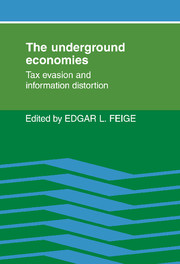Book contents
- Frontmatter
- Contents
- List of contributors
- Preface
- Introduction
- Part I The meaning, measurement, and policy implications of the underground economies
- Part II The underground economy in Western developed nations: measurement in different laboratories
- Part III The underground economy under central planning
- 14 The Soviet second economy in a political and legal perspective
- 15 Second economy and socialism: the Hungarian experience
- Bibliography
15 - Second economy and socialism: the Hungarian experience
Published online by Cambridge University Press: 20 October 2009
- Frontmatter
- Contents
- List of contributors
- Preface
- Introduction
- Part I The meaning, measurement, and policy implications of the underground economies
- Part II The underground economy in Western developed nations: measurement in different laboratories
- Part III The underground economy under central planning
- 14 The Soviet second economy in a political and legal perspective
- 15 Second economy and socialism: the Hungarian experience
- Bibliography
Summary
This chapter examines the extensive presence of the second economy in Hungary as an important cause and consequence of the structural limits and dilemmas of state regulation in a socialist economy. In addition, the second economy is studied as an essential reason why the population considers the system to be a relative success.
We define the second economy as the field of all those economic activities through which the population – legally or illegally – acquires incomes not as employees in the socialist sector. The self-supply ing activities of the households belong to the second economy insofar as they are income-producing activities. Fundamentally, therefore, our definition of the second economy is the same as that of Grossman (1977),who regards all those activities aimed directly at private gain or being in some significant respect in knowing contravention of the law as belonging to the second economy.
We have, however, made three minor modifications:
1 The economizing activities of the population in an attempt to rationally and economically use and spend their incomes are not counted as part of the second economy.
2 All acts performed by employees in the first economy to increase their official earnings by using their bargaining power with their employers – although such acts are directed at private gain – are not part of the second economy but of the first.
3 Also excluded from the second economy are all irregularities committed by employees (mainly in management positions) in the first economy directed at obtaining advantages for their organization in the first economy.
- Type
- Chapter
- Information
- The Underground EconomiesTax Evasion and Information Distortion, pp. 339 - 360Publisher: Cambridge University PressPrint publication year: 1989
- 5
- Cited by



